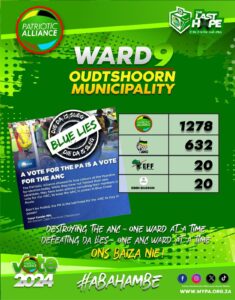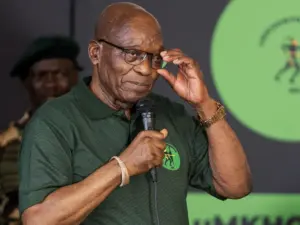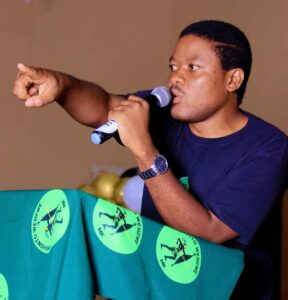By: Wendell Griffen*
On January 8, 2022, the Mail & Guardian (whose masthead asserts that it is “Africa’s Best Read” newspaper) published an opinion column by Lindiwe Sisulu titled “Whose law is it anyway” that has sparked a deep conversation in South Africa.
I learned of it from my friend Allan Boesak during one of our weekly conversations about faith and justice. After I read her piece, I shared it with other justice-minded public theologians in the Samuel DeWitt Proctor Conference with this statement: “This is a must read!”
Lindiwe Sisulu’s parents, Walter and Albertina Sisulu, were leading figures with Nelson Mandela in the African National Congress (ANC) movement that resisted the racist apartheid regime of South Africa. Their daughter’s opinion column shows that she inherited her parents’ zeal for justice.
“Whose law is it anyway” bristles with truth about economic reparation, a subject that the beneficiaries of colonization always try to avoid. Consider the following excerpt:
Let’s not fool ourselves and one another: the primary motivation for the evils of colonialism was and still is economic. It is organised crime; the robbery of other people’s land and resources; the exploitation and despiteful use of their labour. It is also about the reduction of these people to mass consumers and exclusion from the ownership of the factors of production and wealth creation.
But it seems today we have legitimised wrongdoing under the umbrella of the rule of law. Many years down the line Africans manage poverty while others manage wealth. When we talk about transformation, it is just a buzzword? When we talk about reconciliation, what we don’t hear is economic reconciliation.
Lindiwe Sisulu is unapologetically critical of colonized-thinking Black judges, other politicians, and business leaders for their collective failure to demand economic reparation for centuries of legalized land theft and wage theft in South Africa. Because she is a member of the ANC’s executive committee, has been a member of the South African Parliament since 1994, and currently serves as Minister of Tourism for South Africa, her objections to the failure by Black judges, other politicians, and business leaders to demand economic reparation have drawn criticism from some in South Africa, including some among supporters of the current political administration.
However, her critique of the so-called “reconciliation process” is praised by people in South Africa who realize that the 1994 Constitution that purported to end apartheid in the administration of South African was woefully flawed.
Her critique of the well-worn phrase “rule of law” is correct. Like Martin Luther King Jr. did in his Letter From Birmingham City Jail written to white religious leaders who criticized King and the Southern Christian Leadership Conference for its role in supporting nonviolent civil disobedience to Jim Crow laws in Birmingham, Alabama, Lindiwe Sisulu correctly declares that there is a difference between legality and justice.
Slavery was practiced, supported, and defended under “the rule of law.”
Robbery of land and labor of Indigenous people was upheld under “the rule of law.”
Women were denied the right to vote “under the rule of law.”
Minister Sisulu and other people who insist that descendants of Indigenous and enslaved people whose land and labor were stolen by colonizers deserve economic reparation are vilified as opponents of “the rule of law” by white defenders of manifest destiny, self-proclaimed religious conservatives, and colonized-minded Black and Indigenous leaders. They are vilified because colonizers and their lackeys have always referred to “the rule of law” to avoid demands for economic reparations as part of the overall claim for racial justice.
Minister Sisulu’s views are in line with those of Martin Luther King Jr., Malcolm X, Cornel West, Tavis Smiley, Nicole Hannah-Jones, Kimberle Crenshaw, the Black Lives Matter movement, the Poor People Campaign movement, Palestinians, and other Black and Indigenous people around the world who have been and are vilified for demanding economic reparations for legalized robbery, fraud, and other oppression.
I am a Black judge and pastor who was born, reared, and educated in the American South during the final years of the Jim Crow era. I have lived most of my life in the American South since that time. The American South is where I obtained my law degree, my law license, practiced law, was licensed, and ordained as a minister in the religion of Jesus, and where my wife and I raised our sons. My personal and professional experience and knowledge of history lead me to agree with what Minister Sisulu has observed about “the rule of law.”
Most Americans are in denial about white supremacy, racism, and their pervasive influence on the legal system, society, economics, notions of government, religion, and understanding of culture. Michael Eric Dyson described this denial tendency and its effect on racial equity in his introduction to Black Mutiny: The Revolt on the Schooner Amistad, by William Owens, as follows.
It is not overstating the case to suggest that, when it comes to race, we are living in the United States of Amnesia. America cannot solve its race problem because it cannot afford to remember what it has been through, or more accurately, what it has made its Black citizens endure: the horrible, cowardly, vicious legacy of racial domination stoked by religious belief and judicial mandate. The willed forgetfulness of our racial past continues to trap us… It appears easier for most Whites, and for many Blacks, to reenact a pantomime of social civility through comfortable gestures of racial reconciliation than it is to tell each other the truth of the colossal breach of humane behavior and democratic practice that slavery represented.[1]
Derrick Bell, one of the first legal scholars associated with critical race theory, was equally honest in his contribution to the Introduction to Black Mutiny.
The distinctions between slavery, segregation, and current era of quasi-opportunity are real, but the paradoxes built on White dominance and Black subordination are recognizable in each era. Those Blacks and Whites who challenge the racial status quo are seldom hailed as heroes in their own time. Their words and actions are too threatening to what is to allow either those they oppose or those they would help to comprehend when those bold individuals proclaim what might be.
In all times, the law is the handmaiden of those in power. Only in extraordinary circumstances will courts and legislatures break with this traditional role and reach out to the dispossessed, usually in ways that benefit those without power in small ways and in the short run. In large ways and in the long run, the seemingly remedial actions of law stabilize and legitimate even when, as is often the case, the powerful are most active in their opposition to these modest reforms.[2]
Michael Eric Dyson’s observation about the “willed forgetfulness of our racial past” that enables most White people and many Black people” to “reenact a pantomime of social civility through comfortable gestures of racial reconciliation,” and Derrick Bell’s observation that “Blacks and Whites who challenge the racial status quo are seldom hailed as heroes in their own time,” are as true now as when they were made in 1997. That explains why right-wing politicians, religious figures, journalists, neo-fundamental capitalist colonizers and imperialists, and white supremacists are trying to stop teaching, learning, writing, and discourse about the history of racial injustice, including critical race theory, in colleges, universities, and otherwise.
On another level, “willed forgetfulness” and outright hostility to truthful observations about the economic debt owed to descendants of Indigenous and formerly enslaved Africans are at the heart of recent attacks on historically Black colleges and universities (HCBUs) throughout the United States, including bomb threats made to three such institutions in Arkansas where I live.[3]
Black people in the United States and Indigenous people in South Africa and elsewhere have always known that the long pattern of domestic terrorism against our communities, places of learning and worship, our burial places, and our historical sites is a basic aspect of white supremacy and domination.
At the same time, the descendants of Indigenous and formerly enslaved Africans who asserted our inherent rights of dignity, equality, and freedom from oppression have always recognized how White colonizers and their descendants used Black lackeys as agents of pacification. In the early years of the last century Booker T. Washington served that purpose. At the end of the last century and currently judges such as Justice Clarence Thomas and religious figures such as Tony Evans serve that purpose.[4]
A generation ago, Randall Robinson wrote about what the United States owes Africans and African Americans for the damage Black people suffered and continue to suffer because of centuries of slavery, segregation, and discrimination perpetrated under “the rule of law.” After quoting the long settled legal principle that a party wronged by unjust acts is entitled to recompense so the wrongdoer is not unjustly enriched, Robinson wrote:
Only in the case of [B]lack people have the claims, the claimants, the crime, the law, the precedents, the awful contemporary social consequences all been roundly ignored. The thinking must be that the case that cannot be substantively answered is best not acknowledged at all. Hence, the United States government and [W]hite society generally have opted to deal with this debt by forgetting that it is owed. The crime – 246 years of an enterprise murderous both of a people and their culture – is so unprecedentedly massive that it would require some form of collective insanity not to see it and its living victims.
But still many, if not most, [W]hites cannot or will not see it (a behavior that is accommodated by all too many uncomplaining [B]lacks)…America accepts responsibility for little that goes wrong in the world, least of all the contemporary plight of [B]lack Americans. And until America can be made to do so, it is hard to see how we can progress significantly in our race relations.[5]
I thank God for Randall Robinson, Derrick Bell, Michael Eric Dyson, Nicole Hannah Jones, Kimberle Crenshaw, Cornel West, Tavis Smiley, and others who refuse to allow the massive debt owed Africans and African Americans to be disregarded and disallowed by the “willed forgetfulness” and “collective insanity” rationalized by reliance on “the rule of law.”
I thank God that Lindiwe Sisulu refuses to allow reliance on “the rule of law” to silence the rightful claim of South Africans to the reparation owed for the land and labor stolen from them for centuries.
And I thank God for Martin Luther King Jr., Malcolm X, James Cone, Jeremiah Wright Jr., Allan Boesak, and other prophetic religious and secular leaders who proclaim a festering inconvenient truth.
Without reparations for racial injustice, there is no reason to talk about racial reconciliation, let alone imagine that it is likely to happen.
*Wendell Griffen is Circuit Judge for the Sixth Judicial Circuit, Fifth Division in Arkansas, Pastor of New Millennium Church in Little Rock, Arkansas, and a Trustee of the Samuel DeWitt Proctor Conference, and owner/CEO of Griffen Strategic Consulting, a consulting firm on cultural competency and inclusion.








This is onion skin peeled truth, we can’t afford to live in fear of seeking truth to Power, I mean real Power. Power that is used to control everything and seek to continue to control our minds, ears, eyes, senses, feelings and thoughts. What type of freedom is that? What shall becomes of us if we are complacence? Thanks for the fearless daughter of the soil for showing up and raised her voice. The debate is genuine, it shook the world. For me, Mme Lindiwe Sisulu is simply saying we can’t afford cosmetic transformation, we need fundamental transformation in South Africa, our Motherland.
As we continue to go down on our knees to get our land back,
As we continue to protest for quality service delivery,
As we continue to teach children under the trees,
Truth be told, all is not well. A glimpse at our education and health system reflects what former President Thabo Mbeki called “A Two Nation”, the rich and the poor. For how long Morena? For how long God?
Thanks to Mme Lindiwe for standing up and questioning the status quo, emulating Steve Biko who was brutally murdered for his quest for True Humanity. For how long Morena? For how long God?
This is a seminal and fundamental piece that every black and white South African should read. We cannot afford to drop the ball. Greater is He that is within us that he that is without. As an Ordained Methodist minister I cannot agree more with this piece. We as a church community must seek to bring about justice and fairness in our life time.